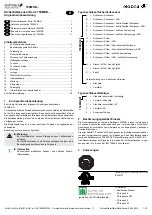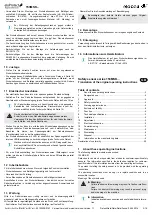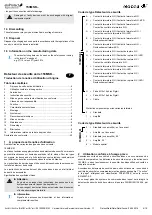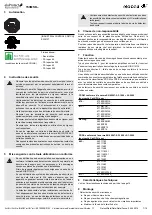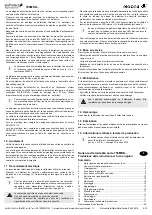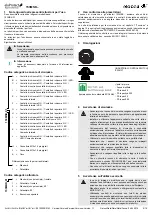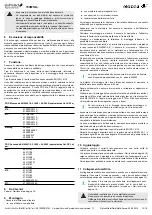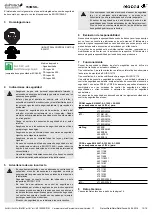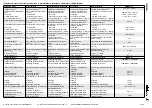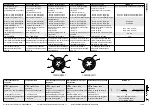
Art.-Nr./Art. No./Réf./N° art/N° art.: 9010003B01M
Version/Version/Version/Versione/Versión: 1.1
Datum/Date/Date/Data/Fecha: 04.04.2016 5/19
153MSK...
8
Technical specifications
See Technical specifications beginning on page 14.
9
Installation
- Safety sensor and actuator
do not use as end stops
do not install in strong magnetic fields
do not expose to any strong shocks or vibrations
keep away from iron filings
- The safety sensor and the accompanying actuators may only be mounted in
a voltage-free state.
- Ensure that all safety sensor and actuator markings are congruently
opposed to one another.
- The installation position is arbitrary. The safety sensor and actuator must
however be mounted in parallel, facing each other.
- Please note the specified installation tolerances and the approved control
options.
- Since the safety sensor is a non-embeddable proximity switch (in
accordance with EN 60947-5-2), the safety sensor and the actuator should
be mounted on non-ferromagnetic material. A free zone of 35 mm is required
in the event that this cannot be avoided.
- Where possible, the safety sensor and actuator should not be mounted on
ferromagnetic material. Changes to the switching distances are to be
expected. A non-ferromagnetic spacer with a thickness of at least 10 mm
must be used in order to avoid influencing the switching distances. The
above-mentioned free zone still applies to the safety sensor and actuator.
- The mounting distance between two safety sensor and actuator systems
must be at least 50 mm.
- Tightly fasten the safety sensor and actuator to the safety device.
- Only M4 flat head screws (e.g. M4 cylinder head screws ISO 4762) may be
used for mounting the safety sensor and actuator. Max. tightening torque
0.7 Nm. Screws made from non-ferromagnetic material (e.g. brass) must be
used.
- The safety sensor may only be mounted on an even surface as failure to do
so may lead to tension which could damage the safety sensor or alter the
switching distances.
- The connection cable of the safety sensor must be protected against
mechanical damage.
- During the assembly process, the requirements according to EN 14119
should be taken into consideration.
- Consider the requirements of EN 60204-1 when mounting, in particular with
regard to appropriate laying. It is recommended to conceal the safety sensor
lead.
10 Adjustment
- Always test the correct functionality with one of the approved safety control
units.
- The specified switching distances (see Technical specifications from
page 14) only apply for mounting on non-ferromagnetic material if the safety
sensor and actuator are mounted in parallel and facing each other. Other
layouts may lead to deviating switching distances.
11 Electrical connection
- Electrical connection is permitted in voltage-free state only.
- Connect the safety sensor according to the specified wire colours or pin
assignment (see Technical specifications from page 14).
- Please ensure that the voltage does not fall below the required minimum
input voltage of the downstream safety processing unit. For that reason
observe the voltage drop at the safety sensor (series resistor) and in the
connection cable.
- The voltage drop for the internal LED circuit is to be considered additionally
for LED safety sensors (see Technical specifications).
- For series connection of the safety sensors (verify approval in advance) their
respective NO paths must be connected in series and the respective NC
paths must be connected in parallel.
12 Commissioning
When commissioning, the following points must be ensured in advance:
- The safety sensor and actuator are positioned correctly and mounted in a
fixed position.
- The supply line is intact.
- There are no iron filings on the safety sensor and actuator.
The safety sensor and the connected control unit must then be tested for correct
functionality.
13 Maintenance
If the safety sensor is mounted and used correctly, no maintenance measures
are be necessary.
We recommend a visual and functional inspection carried out at regular
intervals:
- Check that the safety sensor and actuator are firmly seated.
PDF-M according to EN 60947-5-3:1999 + A1:2005
(corresponds to PLe /Cat.4) for:
470...
470EFR3E11K_
470EFR3E12K_
471...
471M41H31
471EFR3E11K_
471EFR3E12K_
471EFR3E13K_
471EFR3E14K_
eloProg
485EPB
485EPE08A02
485EPE08
4854EPE12
485EPE16
PDF-S according to EN 60947-5-3:1999 + A1:2005
(corresponds to PLd /Cat.3) for:
463...
463111B1
463111B2
463114B1
463114B2
463111B101
463114B101
463121B1
463124B1
470...
470111B1
470115B1
470121B1
470125B1
470EFR2D12K_
471...
471EFR2D14K_
Suitable spacer plates for the safety sensor and actuator are
available from elobau under order number 350009.
To secure the mounting screws against easy disassembly, we
recommend using the screw covers included.
For safety sensors with connection plugs, suitable cable sets and
connectors for assembly are directly available from elobau (see
Technical specifications from page 14).
The control contact is not a safety contact.
It may not be incorporated into a safety circuit.
Use the control contact for non safety-relevant signal and control
functions only.
If several safety sensors with LED are used, the brightness of the
LEDs can decrease with an increasing number of closed safety
doors.

